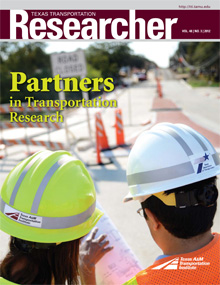Safer Roads, More Work Highlighted at Traffic Safety Conference
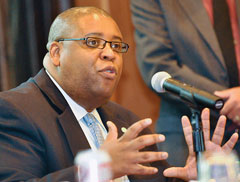
As part of the theme of improving safety on highways in Texas and across the nation, the leader of the National Highway Traffic Safety Administration (NHTSA) and the retiring state legislator known as “Senator Safety” were featured speakers for TTI’s fourth annual Traffic Safety Conference June 4–6, in San Antonio.
David Strickland, NHTSA administrator, told the group of more than 200 that the nation now has its lowest number of traffic fatalities since 1949. “Those successes frankly pale to the fact of how many people we still lose. It is still vexing for all of us that when we do make gains, we still have that many more people we have to reach. The job is never, ever done,” he told the group of traffic safety professionals, pointing to the fact that 33,000 people die in crashes annually nationwide.
State Sen. Steve Ogden, who was the luncheon speaker later in the day, also acknowledged the decreasing fatality rate in Texas, but with a note of caution. “Over the last 10 years, our fatality rate has dropped by 25 percent.” Ogden noted that over 500 fewer Texans are dying on the roadways than just 10 years ago. “We have made a lot of progress. But, obviously we are not done.”
Ogden is credited with safety improvements on rural highways, supporting the installation of cable barriers in highway medians and creating the Center for Transportation Safety at TTI. “He consistently kept roadway safety in the minds of everyone in the legislature,” TTI Agency Director Dennis Christiansen said.
United Arab Emirates Project Addresses Crash Investigation and Reporting
TTI’s Center for Transportation Safety (CTS) is assisting the Emirate of Abu Dhabi with investigating crashes and analyzing post-crash site data.
“The United Arab Emirates, and especially the Emirate of Abu Dhabi, has an extremely high fatality rate,” says TTI Associate Research Scientist Troy Walden, project lead for CTS. “According to its Department of Transport [DOT], the Abu Dhabi fatality rate [based on population] is 50 percent higher than in the United States.”
Walden says DOT wants to start by developing a comprehensive set of procedures and guidelines that deal with the investigation and analysis of its fatal and injury crashes. Walden will produce separate guidebooks for both DOT and Abu Dhabi law-enforcement officers. The DOT guidebook will cover crash investigation and data analysis requirements and options for a reporting process. The guidebook for law-enforcement officers will focus on proper data collection and investigation procedures.
“Senator Safety” Honored at Annual TTI Safety Conference
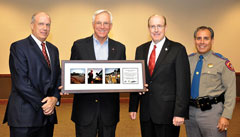
State Sen. Steve Ogden was recently honored jointly by the three state agencies most involved in realizing his vision for enhancing roadway safety in Texas. The recognition came in response to Ogden’s keynote address at the annual Traffic Safety Conference in San Antonio on June 5.
“Mention the name ‘Senator Safety’ to just about anyone in or around the state capitol, and chances are, they’ll know exactly who you’re talking about,” noted TTI Director Dennis Christiansen in his recognition of Ogden. “In the history of the Texas Legislature, very few elected officials have been as steadfastly committed to roadway safety as Senator Steve Ogden. And, more important, even fewer have been as effective in their purpose.”
As part of the recognition, Ogden also earned praise from John Barton, deputy executive director and chief engineer of the Texas Department of Transportation (TxDOT) and Chief Luiz Gonzalez of the Texas Department of Public Safety.
Ogden served as chairman of the Senate Infrastructure Development and Security Committee when the legislature was shaping the state’s most significant transportation policy ever in 2003. As part of that legislation, the senator ensured that 20 percent of all roadway bond financing would be spent on safety improvements. More than $1 billion has been invested in those safety improvements since the program began, and a TTI analysis demonstrates that the improvements have produced a benefit/cost ratio of 13 to 1. In human terms, that translates to more than 100 fewer crash fatalities and more than 1,000 fewer serious-injury crashes each year across Texas.
Turnbull Receives the Ethel S. Birchland Lifetime Achievement Award
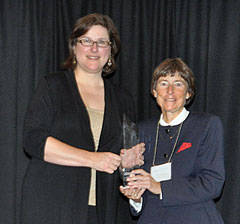
Internationally known transportation leader Katie Turnbull has been honored with a lifetime achievement award by the American Road and Transportation Builders Association’s (ARTBA’s) Transportation Development Foundation. Turnbull, TTI executive associate director, received the Ethel Birchland Lifetime Achievement Award July 26 in Lansdowne, Va.
Turnbull received the award through ARTBA’s Women Leaders in Transportation Design and Construction Council (WLTDCC). The WLTDCC was established in 2010 to promote leadership and career advancement for women in the transportation design and construction industries.
Turnbull, who started at TTI in 1989 as an assistant research scientist, is a recognized expert on high-occupancy vehicle and high-occupancy toll facilities, public transportation, and travel demand management. She has nearly 35 years of experience in the transportation community.
Wunderlich Named Safety Center Acting Director
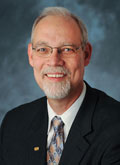
Robert Wunderlich has been named the acting director for the Center for Transportation Safety at TTI. Wunderlich, who formerly served as the City of Garland’s senior managing director for transportation, streets, engineering and stormwater, also holds the title of research engineer since he assumed his new duties on July 9.
Wunderlich is responsible for leading the various research programs for the center, which was established by the Texas Legislature in 2001. He is also responsible for promoting the center’s work to all of its internal and external stakeholder groups.
“We are extremely pleased that Robert is joining TTI,” says Bill Stockton, TTI executive associate agency director. “His outstanding reputation and real-world experiences make him an ideal addition to our strong team.”
“I feel that this new position is a unique opportunity to use my experience and skills to make a difference in the lives of Texans, Americans and others across the globe,” Wunderlich says, “by helping to provide safer roadways and safer vehicle occupants, and by understanding and developing programs for high-risk groups.”
Wunderlich is a past international president of the Institute of Transportation Engineers (ITE) and was named the Transportation Engineer of the Year by the Texas District of ITE in 2007.
TTI Helps Solve Central American Problems

TTI Senior Research Engineer Tom Scullion recently visited road builders in the Dominican Republic (DR) to help them construct their equivalent of the U.S. Interstate Highway System. The upgrade is more than a $1 billion effort. One of the major links under construction is the AutoPista Del Coral, which links major tourist resorts in the east of the island.
The local engineers prefer to use cement-treated bases to handle their heavy truck loads and wet climate. Their main concern has been excessive shrinkage cracking, known as microcracking, which can severely impact pavement life. Several years ago DR engineers began following research conducted at TTI by Scullion and TTI Associate Research Scientist Stephen Sebesta to alleviate this problem.
Two days after finishing, a cured concrete-treated base is subjected to two to four passes with a heavy-slow moving vibratory roller. This causes the base to develop a network of fine cracks, which help prevent wider cracks over time by releasing pressure like tiny fault lines in a tectonic plate. The fine cracks also minimize the risk of cracks in the base reflecting through the asphalt surface layer.
“The Brazilian contractor had never seen this technique before, and they were concerned that it may impact long-term strength gains,” says Scullion. “My role was to explain the benefits of this technique.”
Details on the microcracking procedure can be found in Project Summary Report 0-4502-S: Microcracking for Reduced Shrinkage in Cement-Treated Base.
TTI Contributes to Future of Road Vehicle Automation Workshop
TTI Senior Research Engineers Ginger Goodin and Ed Seymour attended a Transportation Research Board–sponsored workshop on the future of road vehicle automation July 24–26 in Irvine, Calif. They shared the state of the practice and participated in a discussion group to identify areas requiring further research. Goodin presented an overview of her research to a pre-conference workshop focused on managed lanes, including considerations for automated vehicles. The workshop was attended by a wide range of transportation professionals, including automobile manufacturers, universities, technology firms, insurance companies, federal agencies and European stakeholders.
“My goal was to set the stage for the research discussion by highlighting what was going on across the country [in this area],” says Goodin. “In the near term, managed lanes may provide next-generation cars with a designated lane where they can go at high speed with very close spacing and expand roadway capacity.”
Parrish Joins TTI Advisory Council

Colin Parrish, Gov. Rick Perry’s advisor for budget, planning and policy, has recently joined TTI’s Advisory Council. Parrish advises the governor on all transportation-related issues and serves on several advisory groups related to broad policy initiatives, finance and economic development.
Previously, Parrish was an aide to the Texas Transportation Commission, the five-member board that oversees the Texas Department of Transportation. He was chief of staff to State Rep. Wayne Smith, and managed the legislative and committee process for significant regulatory, environmental and transportation-related legislation.
“Colin’s experience in transportation policy matters adds significant value to our advisory council,” says Dennis Christiansen, TTI agency director. “We are extremely pleased that he has taken the time to participate, and we will welcome his advice as we seek to continually enhance our transportation research program.”
The TTI Advisory Council advises TTI on transportation issues and trends and supports the Institute’s research initiatives.
Geiselbrecht Receives IAP2 Certification

TTI Assistant Research Scientist Tina Geiselbrecht has successfully completed 40 hours of instruction by the International Association of Public Participation (IAP2), receiving the IAP2 Certification in Public Participation.
Geiselbrecht’s work centers on public opinion research and public outreach. In assessing public opinion about planned transportation projects, she has conducted numerous stakeholder interviews, focus groups, surveys and discussion groups. The IAP2 certification enhances her skills in public engagement.
The five-day course included subjects involving effective public participation and public communication techniques.
IAP2 is recognized around the world, training employees in all fields concerned with public engagement.
Road User Fee Idea Slowly Gaining Momentum

Attendance for the most recent mileage-based user fee (MBUF) conference nearly doubled from last year, signaling growing interest in what many proponents admit could be decades before implementation. MBUFs, also known as vehicle-miles-traveled fees, are one possibility to replace the current method of funding transportation needs. Instead of relying on an unsustainable gasoline tax to pay for road construction, motorists would be charged more directly for the amount they drive.
More than 250 people attended the Symposium on Mileage-Based User Fees and Transportation Finance in New Jersey this spring, sponsored by the International Bridge, Tunnel and Turnpike Association. TTI originated the symposium with the University of Minnesota in 2009 and was a conference partner for this year’s event.
“More and more people are talking about this topic as they realize that the gasoline tax is not adequate to meet our long-term needs,” says TTI Mobility Management Division Head Ginger Goodin, who was a panel discussion member at the symposium. Goodin and TTI Associate Transportation Researcher Trey Baker are among the national leaders in MBUF research.
The idea of a road-user fee was first discussed as a logical funding approach 10 years ago following an Oregon field test on the topic. Since then, five state departments of transportation and the I-95 Corridor Coalition in the Northeast have conducted studies.

